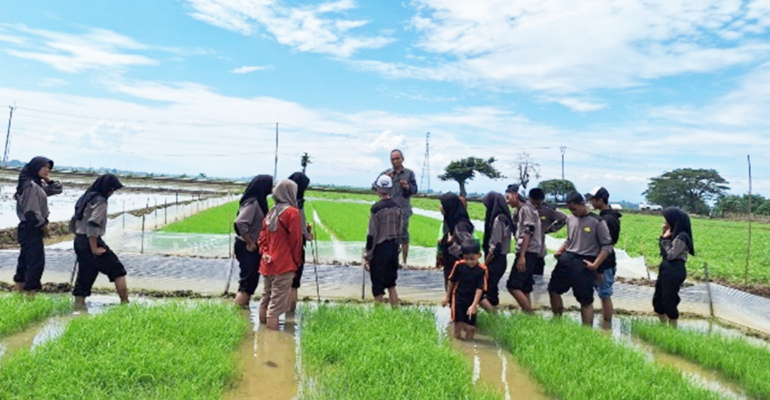IPB University Along with SMKN Compreng Students Mobilise to Secure Rice Production in Subang

It is not easy to plant rice during the rainy season, especially when the rain is still falling unevenly in various regions in Indonesia. Therefore, it is required to have an extra security to the rice plants that have been planted.
To secure rice production, IPB University’s Innovation Village in Kiarasari Village, Compreng Sub-district, Subang Regency implemented pest control with bio-immunisation and egg collection. The combination of these two technologies resulting from IPB University innovation has been tested on a field scale. The activity was carried out in mass, covering 350 hectares of rice plants in one stretch.
Prof Suryo Wiyono, Dean of the Faculty of Agriculture of IPB University said, “In terms of technology, this is the implementation of innovations owned by IPB University to farmers on a fairly wide scale, the combination of bio-immunisation is the best rice stem borer control technology that has been tested on a field scale,” he said.
He continued, the activity was also a learning vehicle for IPB University students and SMKN Compreng students as an effort to encourage future farmers who have advanced Science and Technology (IPTEK) literacy.
“Bio-immunisation is carried out with a combination of special strain bacteria and special types of endophytic fungi that have been tested. Bio-immunisation is done with seed treatment so that the plants that grow will be more resistant to pests and diseases such as brown planthoppers, stem borers and blast disease,” he said.
“In addition to bio-immunisation, there is also a movement to collect borer egg clusters in the nursery. This movement was carried out with the collaboration of IPB University students, SMKN Compreng students, and farmers totalling approximately 50 people,” explained the Professor of Plant Protection.
Dr Dewi Sartiami, a lecturer at IPB University’s Plant Protection Department, who is also part of IPB University’s Innovation Village team, stated that the borer eggs collected will be bred in the laboratory, then parasitoids will be released to strengthen biological control in the fields.
“In the previous season, the yellow rice stem borer (Scirpophaga incertulas) was the most destructive rice pest in the area and the North Coast (Pantura) area of West Java in general. The application of this innovation on a wide scale is expected to contribute to saving rice production in the area,” said Dr Dewi. (*/Lp) (IAAS/RUM)



